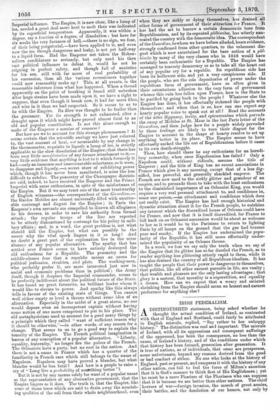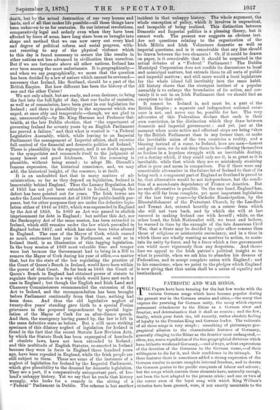IRISH FEDERALISM, death, but by the actual destruction of our
very houses and lands, and of all that makes life possible—all these things have been unknown to us for centuries. So our internal revolutions, comparatively legal and orderly even when they have been effected by force of arms, have long since been so brought into shape and method that we can now carry out every kind and degree of political reform and social progress, with- out resorting to any of the physical violence which to this day is found necessary to secure the like results in other nations not less advanced in civilization than ourselves. But if we are fortunate above all other nations, Ireland has ever been among the most unfortunate. It is geographically— and when we say geographically, we mean that the question has been decided by a law of nature which cannot be reversed— necessary that Ireland, like Scotland, should be a part of the British Empire. But how different has been the history of the one and the other Union !
We not only admit, but are ready, and even desirous, to bring the fact into the full light of day, that our faults of omission, as well as of commission, have been great in our legislation for Ireland ; and there is plausibility in the argument which was urged, at once ably and temperately—though, we are glad to say, unsuccessfully—by Mr. King Harman and Professor Gal- braith, at the late Dublin election, that " the experiment of governing Ireland for seventy years by an English Parliament has proved a failure," and that what is wanted is "a Federal Legislative Assembly, which, while leaving to an Imperial Parliament the management of Imperial affairs, shall exercise full control of the financial and domestic politics of Ireland." There is plausibility in the argument, and it no doubt appeals to the sympathies and commends itself to the judgment of many honest and good Irishmen. Yet the reasoning is plausible, without being sound ; to adopt Mr. Disraeli's famous expression, the historical conscience, and, we may add, the historical insight, of the reasoner, is at fault.
It is an undoubted fact that in many matters of ad- ministration, so far as they depend on legislation, Ireland is lamentably behind England. Thus the Lunacy Regulation Act of 1853 has not yet been extended to Ireland, though the defect has been pointed out for years. The Irish towns are under the Local Government Act of 1858 for public-health pur- poses, but for other purposes they are under the defective legis- lation either of 1846 or 1829, which was superseded in England by the Act of 1858. In 1869 an Act was passed to abolish imprisonment for debt in England ; but neither this Act, nor the Bankruptcy Act of the same session, has been extended to Ireland, which still remains under the law which prevailed in England before 1857, and which has since been twice altered in England. The case of the Mayor of Cork, which caused so much excitement last year in Parliament, as well as in Ireland itself, is an illustration of this lagging legislation.
In the busy session of 1869 most valuable time and temper were lost because the Government had to bring in a Bill to remove the Mayor of Cork during his year of office,—a matter that, but for the state of the law regulating the practice of the Court of Queen's Bench in Ireland, would have been within the power of that Court. So far back as 1843 the Court of Queen's Bench in England had obtained power of statute to regulate their practice in a way which would have met such a case in England ; but though the English and Irish Land and Chancery Commissioners recommended the extension of the Act to Ireland, and the recommendation has been brought before Parliament continually from that time, nothing had been done. And thus the old legislative neglect of twenty-five years' standing gave birth to a special Fenian grievance in the proposed impeachment by special legis- lation of the Mayor of Cork for an after-dinner speech. And then, the emergency having passed by, the law is left in the same defective state as before. But a still more striking specimen of this dilatory neglect of legislation for Ireland is found in the fact that the recent Statute Law Revision Acts, by which the Statute Book has been expurgated of hundreds of obsolete laws, have not been extended to Ireland ; and this multitude of English Statutes, re-enacted in Ireland because they were in force in England three hundred years ago, have been repealed in England, while the Irish people are still subject to them. These are some of the instances of a neglect of legislation for Ireland by the Imperial Parliament, which give plausibility to the demand for domestic legislation. They are a part, if a comparatively unimportant part, of Ire- land's unhappy history. Yet we say that he reads that history wrongly, who looks for a remedy in the sitting of a "Federal" Parliament in Dublin. The scheme is but another incident in that unhappy history. The whole argument, the whole conception of policy, which it involves is unpractical, and incapable of being realized. This distinction between Domestic and Imperial politics is a pleasing theory, but it cannot work. The present war suggests an obvious test. Are not questions relating to the organization of the Irish Militia and Irish Volunteers domestic as well as imperial questions, and is it conceivable that any line should be drawn between the two elements / Or, if it could be drawn on paper, is it conceivable that it should be respected in the actual debates of a " Federal" Parliament ? The Dublin Municipal Corporation does not confide its discussions to local and municipal matters, but extends them to all sorts of public and imperial matters ; and still more would a local legislature for the whole island fall inevitably into the same habit. All history shows that the strongest instinct of a popular assembly is to enlarge the boundaries of its action, and cer- tainly it is not in an Irish Parliament that we should find an exception to that rule.
It cannot be. Ireland is, and must be, a part of the British Empire ; a separate and independent national exist- ence is not, and never can be, possible for her. The very advocates of this Federalism declare that such is their own conviction, in the distinction which they draw between domestic and imperial government ; and yet, just at the moment when more active and effectual steps are being taken by the British Parliament than in any former time, co make the inevitable union of the two countries a reality, and a blessing instead of a curse, to Ireland, here are men—honest and good men, we do not deny them to be—offering themselves as leaders in a hopeless struggle with an inevitable destiny, yet a destiny which, if they could only see it, is as great as it is inevitable, while that which they are so mistakenly straining after is poor and mean in comparison. For if there were any conceivable alternative in the future lot of Ireland to that of its being such a component part of England as Scotland is proud to be, that alternative would be not independence, but the condi- tion of a second-rate dependency of France or America. But no such alternative is possible. On the one hand, England has, by the still far from complete, yet most important legislation of the last forty years—by Catholic Emancipation, by the Disestablishment of the Protestant Church, by the Landlord and Tenant Act, entered heartily on a course from which she will not turn back, and by which she will at last succeed in making Ireland one with herself ; while, on the other hand, the Irish Nationalist will, we trust and believe, be warned in time by the example of the late American Civil War, that a State may be decided by quite other reasons than those of religious or aristocratic ascendancy, and in a time in which these are wholly wanting as motives to action, to main- tain its unity by force, and by a force which a free government can wield more vigorously than any despotism. And there- fore we appeal to the Irish patriot's political insight as to what is possible, when we ask him to abandon his dreams of Federalism, and to accept complete union with England ; and to his conscience, when we point to the pledges which England is now giving that that union shall be a union of equality and brotherhood.































 Previous page
Previous page